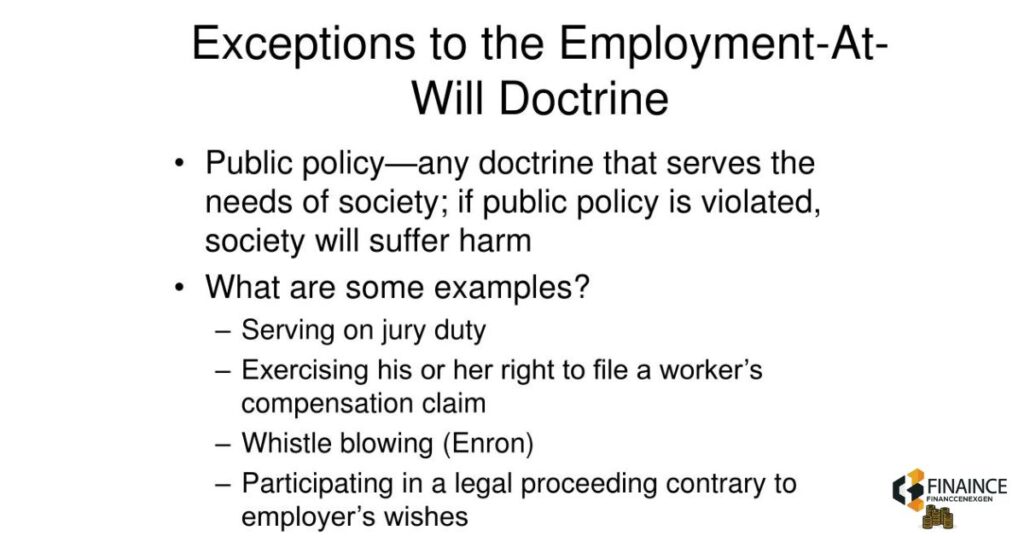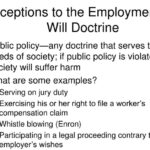As an employee in Texas, you may feel vulnerable to termination at any moment. The texas at-will employment doctrine allows employers to fire workers for virtually any reason, or no reason at all. This can create significant uncertainty and anxiety for hardworking Texans.
However, there are important exceptions to the at-will rule that protect employees from unlawful dismissal. Understanding your rights under state and federal laws is crucial to safeguarding your job. In this comprehensive guide, we’ll explore the key exceptions to Texas’ at-will employment doctrine and empower you to assert your workplace protections.
What is the At-Will Employment Doctrine in Texas?
The “the texas at will” employment doctrine, which has been the law in Texas since 1888, stipulates that employment for an indefinite term can be terminated by either the employer or the employee at will and without cause. This means that, absent a specific agreement to the contrary, Texas employers can terminate their employees for a good reason, a bad reason, or even no reason at all. Conversely, employees in Texas can also quit their jobs at any time, for any reason, or for no reason.
The rationale behind the “the texas at will” employment doctrine is that it provides flexibility for both employers and employees, allowing them to freely enter and exit the employment relationship as they see fit. However, this doctrine is not without its limitations, as various federal and state laws have established exceptions that prohibit termination or other adverse employment actions based on certain protected characteristics or activities.
Key Exceptions to the At-Will Doctrine
While the “the texas at will” employment doctrine remains the default rule in Texas, there are several notable exceptions that employers must be aware of. These exceptions are primarily codified in federal and state laws, as well as a narrow common law exception established by the Texas Supreme Court.
Employment Discrimination Laws in Texas
Overview of the key federal and state laws that prohibit employment discrimination in Texas.
The Texas Commission on Human Rights Act (TCHRA)
One of the most significant exceptions to this employment doctrine is the Texas Commission on Human Rights Act (TCHRA). This state law prohibits employers from discriminating against employees or job applicants based on their race, color, disability, religion, sex, national origin, or age.
Additionally, the TCHRA prohibits retaliation against employees who engage in protected activities, such as opposing discriminatory practices or filing a charge of discrimination. When resolving disputes under the TCHRA, Texas courts often look to analogous federal laws, such as Title VII of the Civil Rights Act of 1964, for guidance.
This interplay between state and federal employment laws helps to ensure a consistent and comprehensive approach to addressing discrimination in the workplace.
Federal Anti-Discrimination Laws
In addition to the TCHRA, federal employment laws also play a significant role in limiting the “the texas at will” employment doctrine. These laws include:
Title VII of the Civil Rights Act
Title VII prohibits employers with 15 or more employees from discriminating against individuals based on their race, color, religion, sex, or national origin. This federal law also prohibits retaliation against employees who oppose or participate in the investigation of unlawful employment practices.
The Age Discrimination in Employment Act (ADEA)
The ADEA prohibits employers with 20 or more employees from discriminating against individuals who are 40 years of age or older. This law helps to protect older workers from being unfairly targeted for termination or other adverse employment actions due to their age.
The Americans with Disabilities Act (ADA)
The ADA, which applies to employers with 15 or more employees, prohibits discrimination against qualified individuals with disabilities. Employers subject to the ADA must also provide reasonable accommodations to employees with disabilities, unless doing so would create an undue hardship for the employer.
The Family and Medical Leave Act (FMLA)
The FMLA, which applies to private employers with 50 or more employees and all state and local government employers, provides eligible employees with up to 12 weeks of job-protected leave for certain medical or family-related reasons. Employers are prohibited from retaliating against employees for exercising their rights under the FMLA.
Other Key Employment Laws in Texas
Exploration of additional Texas and federal laws that provide employment protections for workers.
The Texas Labor Code
In addition to the TCHRA and federal anti-discrimination laws, the Texas Labor Code also establishes several exceptions to the “the texas at will” employment doctrine. These include prohibitions on terminating employees for filing workers’ compensation claims, serving on a jury, or complying with a subpoena.
Federal Employment Laws
Other federal employment laws that further limit this doctrine include the National Labor Relations Act (NLRA), the Genetic Information Nondiscrimination Act (GINA), the Uniformed Services Employment and Reemployment Rights Act (USERRA), and the Worker Adjustment and Retraining Notification (WARN) Act.
The NLRA, for example, prohibits employers from interfering with employees’ rights to self-organize, collectively bargain, and engage in other protected, concerted activities, even within a non-unionized workforce. GINA, on the other hand, restricts the use of genetic information in making employment decisions, while USERRA provides employment protections for individuals serving in the military. The WARN Act requires certain larger employers to provide advance notice of plant closings and mass layoffs to affected employees.
Exceptions Under Texas Common Law
Analysis of the limited common law exception to at-will employment established by the Texas Supreme Court.
The Sabine Pilot Exception
While the “the texas at will” employment doctrine is the default rule in Texas, the state’s common law has established a narrow exception. In the 1985 case of Sabine Pilot Service, Inc. v. Hauck, the Texas Supreme Court ruled that an employee cannot be terminated for the sole reason of refusing to perform an illegal act that would subject the employee to criminal liability.
This exception, known as the “Sabine Pilot” exception, represents a rare instance where the Texas courts have carved out a public policy-based limitation on the “the texas at will” employment doctrine. However, it is important to note that this exception is quite narrow and does not apply to the majority of employment termination scenarios.
Protecting Employee Rights in Texas
Guidance on strategies for employees to safeguard their rights and address workplace issues.
Recognizing and Addressing Unlawful Termination
Given the complexities of the doctrine and the various exceptions that exist, it is essential for both employers and employees to be aware of their rights and obligations under the law. Employees in Texas who believe they have been terminated unlawfully should consult with an experienced employment law attorney to understand their legal options and take appropriate action.
Preventing and Responding to Workplace Discrimination and Harassment
In addition to addressing unlawful termination, employees in Texas must also be vigilant in recognizing and addressing workplace discrimination and harassment. Federal and state laws, such as Title VII and the TCHRA, provide robust protections against these unlawful employment practices.
Employees who believe they have been subjected to discrimination or harassment should report their concerns to their employer and, if necessary, file a charge with the appropriate government agency.
FAQ
What is the at-will employment doctrine in Texas?
The at-will employment doctrine in Texas allows employers and employees to terminate the employment relationship at any time, for any reason, or for no reason at all, absent a specific agreement to the contrary.
What are the key exceptions to the at-will employment doctrine in Texas?
The key exceptions to the at-will employment doctrine in Texas include federal and state anti-discrimination laws, such as Title VII, the ADEA, and the TCHRA; the FMLA; the Texas Labor Code; and the narrow “Sabine Pilot” exception established by the Texas Supreme Court.
What laws prohibit employment discrimination in Texas?
The primary laws prohibiting employment discrimination in Texas are the Texas Commission on Human Rights Act (TCHRA) and various federal laws, including Title VII of the Civil Rights Act, the ADEA, and the ADA.
What are the employee protections under the Texas Labor Code?
The Texas Labor Code provides several exceptions to the at-will employment doctrine, including protections for employees who file workers’ compensation claims, serve on a jury, or comply with a subpoena.
Can an employee be terminated for refusing to perform an illegal act?
Under the Sabine Pilot exception to the at-will employment doctrine in Texas, an employee cannot be terminated for the sole reason of refusing to perform an illegal act that would subject the employee to criminal liability.
Conclusion
The “the texas at will” employment doctrine has been the cornerstone of Texas employment law for over a century. However, this doctrine is not absolute, as both federal and state laws have established numerous exceptions to protect employees from unlawful termination, discrimination, and retaliation.
By understanding their rights and the limitations on the at-will doctrine, both employers and employees in Texas can navigate the complexities of employment law and ensure a fair and equitable workplace.







